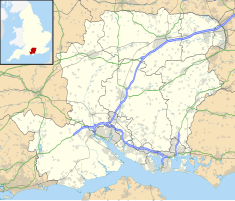The Winchester Law Courts is a judicial facility just off the High Street in Winchester, Hampshire, England. As well as accommodating the Crown Court, which deals with criminal cases, the complex also accommodates the County Court and the Winchester District Registry of the High Court.
| Winchester Law Courts | |
|---|---|
 Winchester Law Courts | |
| Location | High Street, Winchester |
| Coordinates | 51°03′45″N 1°19′09″W / 51.0625°N 1.3191°W |
| Built | 1974 |
| Architect | Louis de Soissons and Richard Fraser |
| Architectural style(s) | Modernist style |
History
editUntil the early 1970s, judicial hearings in Winchester were held in the Great Hall of Winchester Castle.[1] However, as the number of court cases in Winchester grew, it became necessary to commission a dedicated courthouse. The site selected by the Lord Chancellor's Department, which was just to the east of the Great Hall, formed part of a larger scheme initiated by Hampshire County Council to form a new civic square, with the proposed law courts to the south, Trafalgar House to the east and Three Minsters House to the north.[2]
Construction of the new building started in 1966. It was designed in outline by Louis de Soissons and in detail by Richard Fraser in the modernist style,[3] built in stone with brick and flint panels at a cost of £2.6 million and was officially opened by the Lord Chancellor, Lord Hailsham, on 22 February 1974.[4][5][6] The design involved twelve bays which alternated between (i) stone-cased bays which projected forward and featured flint panels on the lower floors and tripartite casement windows on the top floor (ii) bays which were recessed and featured tri-partite casement windows on the first three floors and brick panels on the upper floors. Internally, the building was laid out to accommodate 15 courtrooms.[7]
Until the mid-1990s, the complex also contained magistrates' courts, and these temporarily returned in 2011 whilst the court buildings in Basingstoke were being refurbished.[8] A sculpture, by Rachel Fenner, recalling elements of the legend of King Arthur was commissioned to celebrate the Diamond Jubilee of Elizabeth II and unveiled in the civic square in front off the courthouse in 2013.[9]
In February 2017, in an attempt to make the criminal justice system less London-centric, the then Lord Chief Justice, Lord Thomas, presided at a sitting of the Court of Appeal at Winchester.[10] Notable cases include the trial and conviction of Rose West, in November 1995, for ten murders,[11] and the trial and conviction of Britain's youngest female murderer, Sharon Carr, for the murder of Katie Rackliff in March 1997.[12]
References
edit- ^ Borrell Clive; Christopher Walker (15 November 1973). "Hostage threat as IRA eight are convicted in London bombs trial" (JPEG). The Times. p. 1. Retrieved 20 January 2023.
- ^ Historic England. "Trafalgar House (1095342)". National Heritage List for England. Retrieved 20 January 2023.
- ^ "A Visit to Winchester". 20th Century Society. 27 November 2016. Retrieved 20 January 2023.
- ^ Inscription in the main entrance hall of the complex.
- ^ "Crane lined up for court refurbishment". Hampshire Chronicle. 22 February 2008. Retrieved 20 January 2023.
- ^ "Law Courts and Courtrooms 1: The Buildings of the Criminal Law". Historic England. 1 August 2016. p. 16. Retrieved 20 January 2023.
- ^ "Winchester". Ministry of Justice. Retrieved 20 January 2023.
- ^ Napier, Andrew (2 October 2011). "Magistrates court reopens in Winchester". Hampshire Chronicle. Retrieved 20 January 2023.
- ^ Fenner, Rachel. "Coronation Jubilee Sculpture". Art.UK. Retrieved 20 January 2023.
- ^ "The most senior judge in England and Wales will sit at Winchester Law Courts". Hampshire Chronicle article. 26 January 2017. Retrieved 20 January 2023.
- ^ Masters, Brian (9 September 2011). "Fred West's final crime". The Guardian. Retrieved 20 January 2023.
- ^ Sengupta, Kim (26 March 1997). "I was born to be a killer. Every night I see the Devil in my dreams". The Independent. Retrieved 20 January 2023.
